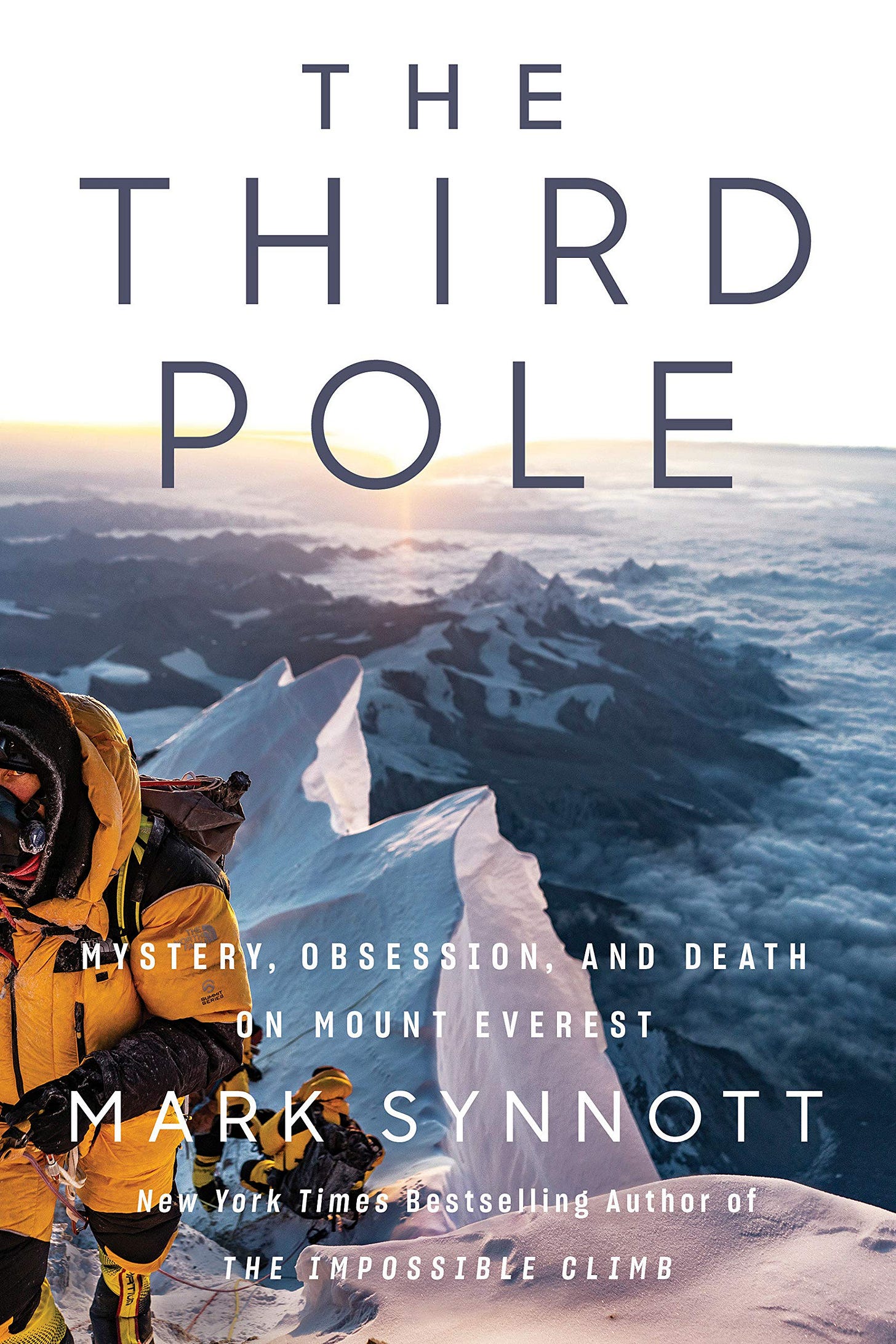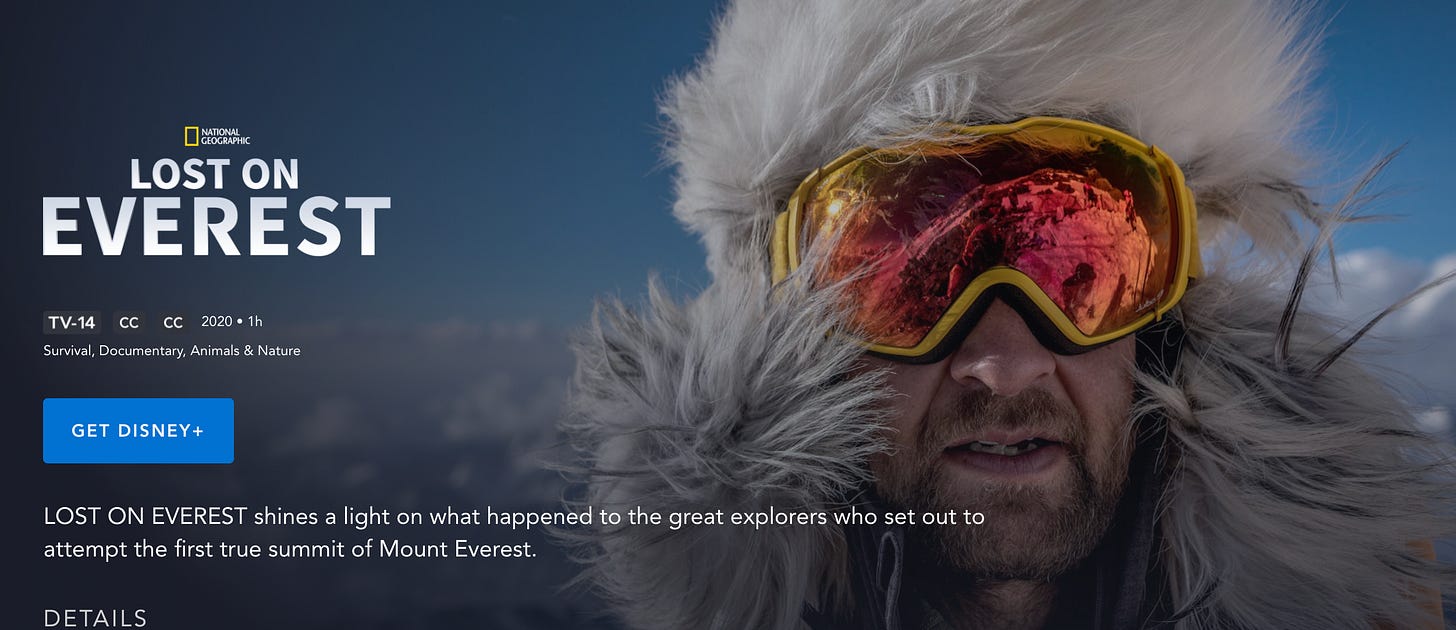I’ve written already about my passing fascination with the people who climb Everest. It’s not an enduring obsession, mind, like the ones I have about competition-based reality TV1 and businesses-gone-bad podcasts2 but I can’t seem to resist a well-told story about dudes — and it’s almost always dudes — who decide to climb the tallest mountain on our planet for no good reason.
Like, your Everest ascent3 has very few knock-on benefits. Maybe you can make the case that the Sherpas and the ecosystem of cooks, etc., that surround the camps are making more money than they could otherwise hope for. But that case gets thin when you look at the damage all of this tourism is doing to the conditions on the mountain itself, like climbers just leaving their crap4 everywhere. To say nothing about the permit system that, yes, feeds money into the coffers of poor countries like Nepal but that also goes into the coffers of countries like China, whose relationship with Tibet is anything but cool and froody.
What I’m saying is that it is complicated, this dream to climb Everest.
Writer and mountaineer Mark Synnott uses the whole of The Third Pole5 to justify his climbing of Everest in 2019. Ostensibly, he joins this expedition to help a buddy find the camera that George Mallory, the first white person to get anywhere near the summit, left up there. While Mallory’s body was found on the mountain in 1999, climbing partner Andrew Irvine’s hasn’t been. The camera is thought to be with Itvine, wherever that is, and that the film might still be in decent enough shape to be developed.
I mean … sure. This is a thing that would be nice to know — and any photos might6 let us know if the pair summited before their deaths — but really makes no difference. Is it worth risking your life to find out, tho? And the lives of the others you are with? Because any place with a “Death Zone” should make you think very hard about risk and reward — and about your death’s impact on those you left behind.
Which might be the main problem I have with all of these dudes, historic and otherwise, who choose to climb Everest. Mallory left behind his wife and three small children who had no real means of support once he was gone. Synnott talks about his wife and small child7 but doesn’t spend much time on how this trip could impact them.8 It’s one thing to be sent to the front in WWI, which Mallory was; it’s another to opt-in on an excursion that (mostly) feeds your ego and might get your name in a book somewhere.9
But I do admit that I just don’t get the appeal and might be looking for ways to be irritated by those who can imagine doing nothing else, even when they use a trip to find a historically important camera as cover for a thing they wanted to do anyway.
Rather than read The Third Pole, which is a perfectly fine book,10 you can watch the gorgeous hour-long documentary Lost on Everest, which is streaming on Disney+. A National Geographic-funded film team came along with Synnott and they were able to use a drone to capture some amazing footage. With a big enough TV and sharp enough sound system, you could sit in a vacuum chamber and come pretty close to recreating the climbing experience but without the frostbite and stroke risk.
The film does a great job, too, of hitting the highlights of the raison d’etre for the expedition, how they made it happen, and the conditions along the way. But the book has a lot more freedom to talk about the Chinese government, the pressure said government put on the Sherpas, and the Everest Conga line.11 The film, however, features more of the climbers justifying their decision to climb, despite all of the costs, and alleging all of the naysayers would understand if they were standing on the mountain themselves.
I mean … maybe? I have some questions about your sample size, however. Anyone who would opt to be on the mountain is already half-convinced it is worth it.
Still, I will likely buy and/or watch the next Everest-adjacent property to come along, if only because it gives me something to grouse about. So who is really in the wrong here?
Have thoughts about Mallory, Sinnott, or China? Tell me!
Eventually, I’ll need to talk about Full Bloom and All That Glitters on HBO Max but today is not that day.
and, one hopes, descent
literally and otherwise
If you are local, I’ll leave my copy in the Little Free Library near the Wilber Park tennis courts. It’s yours.
with a heavy emphasis on might
he has three old kids from a previous marriage
To his credit, Synnott does mention how his love for mountaineering was a contributing factor in the crumbling of his first marriage.
I know. You could make the same argument about quests like going to Mars. I would argue that space exploration has led to some remarkable discoveries and technologies that have trickled down. Like, say, GPS and microchips. But I would also argue that my feelings on space v. Everest are murky.
Synnott, I suspect, is a much better mountaineer than writer. His prose is perfectly adequate but his mountain skills are legendary.
For a quickie overview on that last one, look here. It’s not great — and it’s still happening.







You might (or might not) like stories from women who've climbed Everest. The Tough Girl Challenges podcast has had a number of them on, many "firsts". Cathy O'Dowd (on at least one ep) has written two books about her climbs - Free to Decide and For the Love of It. https://www.amazon.com/Cathy-ODowd/e/B0045870W4/ref=dp_byline_cont_pop_book_1
ToughGirl https://www.toughgirlchallenges.com/search-results/q-everest/qc-blogs https://www.toughgirlchallenges.com/search-results/q-everest/qc-pages